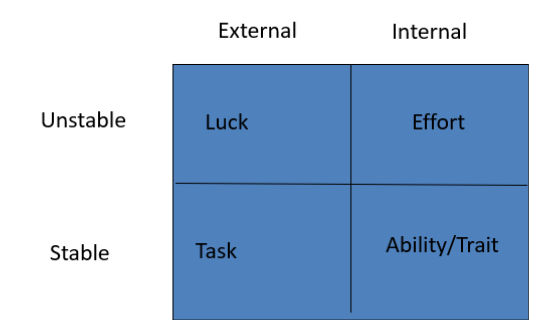Lecture 12 Motivation and Goal Setting
1/26
There's no tags or description
Looks like no tags are added yet.
Name | Mastery | Learn | Test | Matching | Spaced | Call with Kai |
|---|
No analytics yet
Send a link to your students to track their progress
27 Terms
Motivation
The psychological forces within a person that determine: direction of behavior, intensity of effort (how hard we work), persistence displayed in meeting goals
Extrinsic Motivation
Desire to perform an act to meet external demands/requirements… behavior performed to acquire rewards… motivation source is the consequence of an action
Classical conditioning- associated stimuli (Pavlov & food/bell) Operant conditioning- consequences
Social learning- models/imitation… Social cognition- influence of others on thoughts, feelings, and behaviors
Intrinsic Motivation
Desire to perform an act because it is satisfying/pleasurable in and of itself… motivation comes from performing the task/work… satisfies internal need/desire (biology, cognition, emotion, spiritual, moral)
Extrinsic versus Intrinsic Motivators
The availability of extrinsic motivators reduces the intrinsic motivation stemming from the task itself… both rewards are important in enhancing motivation
Drive Reduction Theory of Motivation
Approach to motivation that assumes behavior arises from physiological needs that cause internal drives to push the organism to satisfy the need/reduce tension/arousal
Need
A requirement of some material (food/water), it’s essential for survival
Drive
Psychological tension/physical arousal arising when there is a need to motivate the organism to act in order to fulfil the need/reduce tension
Primary drives
they involve needs of the body (hunger/thirst)
Acquired (secondary) drives
Those drives that are learned through experience or conditioning, such as the need for money/social approval
Homeostasis
Tendency of the body to maintain a steady state
Arousal Approach to Motivation
People are said to have an optimal level of tension that they seek to maintain by increasing/decreasing stimulation
Stimulus motive
motive that appears to be unlearned but causes an increase in stimulation (curiosity)
Sensation seeker
someone who needs more arousal than the average person
Yerkes-Dodson Law
Performance is related to arousal; moderate levels of arousal lead to better performance than do levels of arousal that are too low or too high… easy tasks require a high-moderate level while more difficult tasks require a low-moderate level.
Optimal level of arousal
We generally perform easy tasks well if we are highly aroused and accomplish difficult tasks well if we are not very aroused.
Instinct Theories of Motivation
The notion that human behavior is motivated by certain innate patterns of action that are activated in response to stimuli (not the same as genetic tendencies)… rejected theory because behavior is diverse/unpredictable
Achievement Goal Theory
Goals/perceptions are the main factors in motivation… goals: outcome- defeating others/winning, and task orientation- improving on skill/past performances… perception- how does one compare…
Attribution Theory
Focuses on how people explain their successes/failures… stability factor- permanent/unstable… locus of causality- cause of the behavior is external /internal… locus of control- what can be controlled/not

Goal
the objective of an action… in regards to sports performance- specified level of proficiency on a task within a specified time limit
Human behavior, including athletic performance, can be causally directed by consciously setting goals
the most important goals were: 34% improving performance, 24% winning, 19% fun/enjoyment
athletes preferred: 20% very difficult goals, 60% difficult goals, 14% moderate goals
Primary characteristics of a goal
Content: difficult? clear? timing? - difficult yet attainable goals are more effective than easy/moderate goals… specific goals are more effective than vague(“do your best”)… short term goals help better attain long-term goals… setting goals improves performance by .34
Intensity: how committed are you? important to you? you must accept the goal to be effective… Timely feedback is needed for goal setting to be effective.
Why hasn’t goal setting worked as well in sport research?*
1. The goals have not been difficult 2. Assigned goals were not accepted 3. Subjects in the “do your best” group set specific goals 4. Task complexity
Moderator of Goal Attainment
Feedback- product/outcome, level of ability- elite, task complexity- simple > complex, physical self-esteem- high>low
Putative mechanisms*
Directs attention (Focused on the goal), Regulates intensity of effort (how hard you are going to push), Regulates duration of effort ((how long you are going to push) (especially in adversity)), Encourages reconsideration of technique (changing the way you study if you have a C but want an A)
Goal Theory
Specific, difficult but realistic, accepted by the person, used to evaluate performance, linked to feedback and rewards, set by individuals or groups
Practical applications
Coach increase performance, fitness, strength, agility, % body fat, Clinical exercise physiologist, Nutritionist – weight loss, Physical therapy – injury rehabilitation, Sports psychologist/consultant
Summary*
Goal setting in sports and exercise is an idea that, in theory, should work. However, the natural feedback with movement and the competitive nature of sports, especially for elite-level athletes, may mitigate the potential effectiveness of formal goal setting because everyone does it informally anyway.